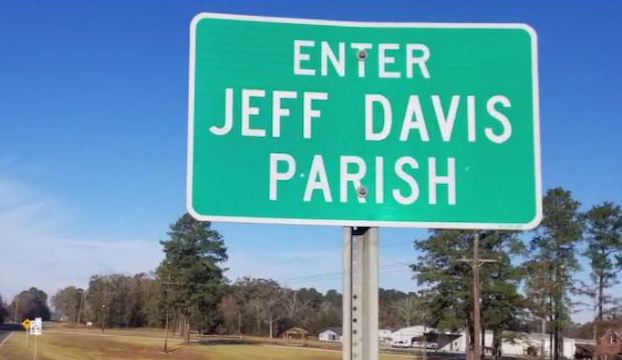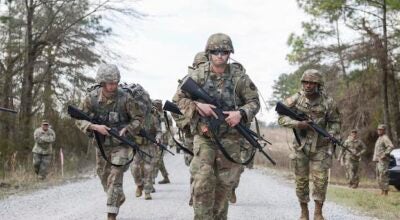‘We were like family’: In December 1972, W.O. Boston High School Panthers beat Haynesville 11-6 to claim state football title
Published 4:55 am Sunday, December 4, 2022

- Among the 1971 W. O. Boston Panthers were, front row from left, Clarence Lockett (80) and Claude Syas (71); and back row, from left: Bobby Peters (74), Joe Cains (31) and Marshall Lawson (11). The 1971 team was ineligible for the playoffs despite going undefeated, but the Panthers captured the 1972 championship. (Special to the American Press)
The W.O. Boston Panthers filled the trophy case in 1972, winning state championships in boys basketball and girls track and field in the spring semester. In December, the Panthers completed their trio of titles by winning the football state title with a thrilling 11-6 win over two-time defending champion Haynesville.
The Panthers football featured a few future college players such as quarterback Marshall Lawson (Michigan State) and running back/receiver Robert Lavergne (University of Houston), but former players say the true secret to success was Panther pride – the camaraderie and work ethic shared by the school’s students, teachers and coaches.
“We had some tremendous athletes and they were outstanding kids,” Herman Weston, an assistant football coach at the time, said. “Head Coach Wiley Stewart and the staff was tremendous. The reason we were successful in football, basketball and track is because we were like a family. It was a wonderful experience. We stressed discipline and didn’t have any problems. We were close with the kids.”
Lawson said the football team was a close-knit group.
“We had good guys, there was no jealousy or envy, nobody had a big head,” he said. “I don’t think anybody thought they were the focus of the team. We didn’t have any issues or any jealousy. Those are things that can kill a team.”
Nothing killed the Panthers, who lost their opening game to Vinton before rolling off 13 straight wins, none more dramatic than the final one.
“Some of us had never heard of Haynesville or knew where it was,” Lawson said. “But we found out they were good because they had won state the two years before that. As we read the paper we learned that they had good players up there, had tradition. They were good before integration and the African-American school there (Carter Woodson) had also been good.”
A muddy field in Haynesville slowed Boston’s passing game, but was ideal for powerful running back Henry Jones and his new backfield mate, George Walrond, who spent most of the season playing on the offensive line.
Walrond scored the Boston touchdown on a first quarter run. Lavergne added a 36-yard field goal in the fourth quarter to put the Cougars ahead 11-0. Haynesville narrowed the lead to 11-6 on a touchdown pass from Rocky Grisby to Kenny Jackson.
Haynesville intercepted a Lawson pass in the final minute, returning it into Panther territory, but the Boston defense stopped the drive to secure the win.
The championship was extra sweet since the Panthers did not have a chance to compete in the playoffs the previous season despite winning 9 of 10 regular season games. The team was barred from the playoffs due to alleged use of an ineligible player.
“We knew we were good and would have had a chance to win state,” Lawson said of the 1971 team. “That team was very good and would have won state, too.”
Lawson said players didn’t have a problem sharing credit for the team’s success.
“A lot of the publicity went to myself, Lavergne and Walrond, but the strength that gets overlooked was the defense,” he said. “I think they only allowed 90 points all year. We had big Henry, Charles Patterson, a basketball player who only played football his last year. Ricky Aaron. We had about 19 seniors, a good amount for an AA team.
“Everybody was grounded, we didn’t have any superstars. Everybody just worked hard, went to practice every day and played hard. Coach Stewart believed in good fundamentals and discipline. He didn’t want us complaining to officials. He wanted the team to play hard and the coaches would take care of the rest.”
Receiver Greg Gauthier said practices were can’t-miss events.
“We practiced hard,” he said. “The coaches made funny comments, but not in a bullying way. No one wanted to miss practice because you knew something would happen and we were all friends.”
Weston said Stewart is one of the best coaches to work with in the area.
“Coach Stewart was a jewel,” he said. “He hired me as an assistant out of college. He was remarkable. The biggest thing he was concerned with was grooming us into young men. He coached me in high school. We looked up to him as being like a father. He was one of the winningest coaches in Southwest Louisiana but never got the recognition he deserved.
“We worked with those young men and built character. They’d go off to college and come back and talk about all the memories we had created. It’s a joyous occasion when a kid comes back and lets us know how much they appreciated what we did for them while they were in school.”
Gauthier, who would later lead Lake Charles-Boston to 14 state track and field state championships, said Stewart made a lasting impression on him.
“When I became a coach I used the same things I learned from Coach Stewart,” he said. “One was the concept of family. He didn’t treat the superstars any differently than the regular kids. We knew that the coaches cared about us, on and off the field. They were like our teachers and parents.”
Gauthier said the players are still close.
“We can go years without seeing each other, but when we do, we always stop to talk and laugh,” he said. “We’re still friends. We still call each other by the same nicknames.”
Stewart made sure everyone connected to the program felt like part of the family.
“For one of the road games he put folding chairs between the aisles on the bus so all the players were together,” Gauthier said.
“The cheerleaders, the band members, we were all like a family. When you went to Boston, you were part of the Panther family.”





